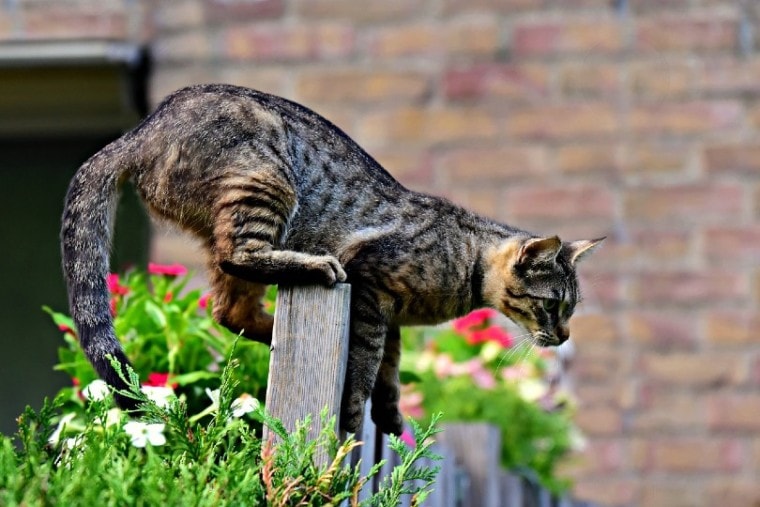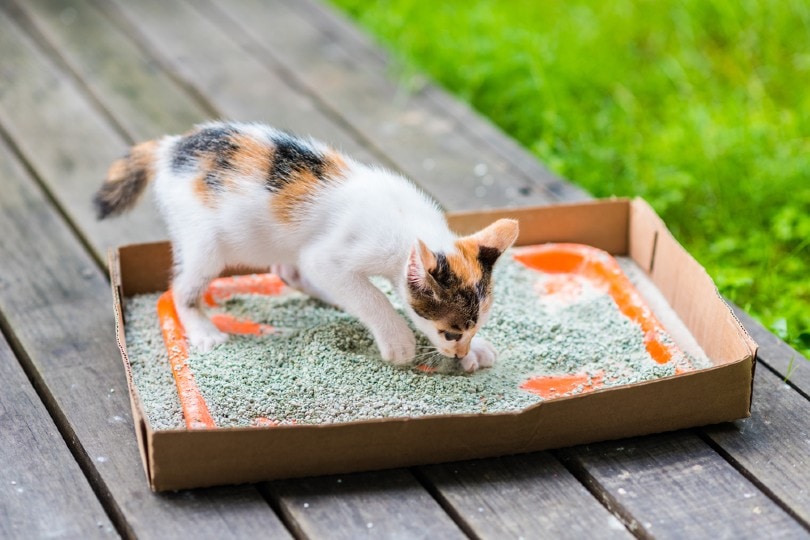
Gardening is not only an enjoyable, earth-friendly hobby but can also be beneficial to our health. We feel a burst of pride and joy as we watch our carefully cultivated fruits and flowers bloom each year. But where we see a blank canvas for planting and growing, the neighborhood cats look at the fresh soil in our gardens and see something else: a toilet.
Outdoor cats, whether owned or stray, can cause a lot of disturbance in the natural ecosystem of your neighborhood. They can also leave you a lot of unwanted gifts buried in the soil of your flower beds. Cats using your garden as a litter box is not only unpleasant but can be unhealthy as well.
So what can you do to protect your garden and yourself? Here are 10 proven methods to keep cats out of your garden.
The 10 Ways to Keep Cats Out Of Your Garden
1. Add Some New Plants To Your Garden
One method of keeping cats out of your garden is to add some new plants with strong scents that kitties dislike. Don’t worry that doesn’t mean they’ll smell bad to humans too!
Scatter a few of these around your garden area to keep cats away.
2. Make The Ground Uninviting

Cats prefer soil that is loose, soft, and easy to dig in when they do their business. To encourage them to find a new toilet spot, try scattering twigs, pinecones, mulch, and other prickly natural materials into your garden beds. You can also spread chicken wire or lattice over your garden after planting. Your new plants will grow through the holes and cats will look elsewhere for an outdoor litter box.
3. Use Natural Scents To Repel Cats
Cats dislike the smell of several easily obtained household waste items. For example, most cats can’t stand the smell of citrus. Try scattering orange and grapefruit peels in your garden. Used coffee grounds create another cat-repellent scent. Some cats are even put off by the smell of human hair! One scent object you shouldn’t use is mothballs. While they will repel cats, they are also toxic to them, and the point is to keep the cats out of the garden without hurting them.
4. Wash Up Well

Like dogs, cats will develop a preferred spot to eliminate and come back to it over and over. To help break this habit, take a garden hose to any areas you detect the scent of cat urine. Sidewalks, patio furniture, or even your back deck can be sprayed down and even cleaned with soap or an enzymatic cleaner.
5. Try Commercial Cat Repellent
If your at-home cat scent repellent isn’t working, try purchasing a commercial cat repellent. Look for one that’s safe to use around your plants, kids, and your pets. These products are usually made with concentrated scents cats hate or with urine from actual predators like coyotes.
6. Install A Sprinkler

This is a more elaborate and expensive method, but you can try installing motion-activated sprinklers in your yard or garden. When cats try to sneak in to do their business, they’ll get drenched. Since most cats hate water, this could inspire them to seek out an easier and drier toilet area.
7. Fence Your Garden
This may seem like an obvious solution but because cats are expert climbers and jumpers, you’ll need to spring for a legitimate, ideally 6 feet high fence. Fencing might especially be worth it if you live in a rural area where deer or other wildlife are also invading your garden.
8. Get Loud

If strong scents don’t keep cats out of your garden, maybe loud noises will. Try placing wind chimes in your yard or stringing bells near where the cats are digging. Cats’ ears are more sensitive than humans and the negative experience of having a noisy trip to the toilet could be enough to keep them away.
9. Buy A Cat Repelling Device
Several motion-activated cat repellent devices are available to purchase. They usually work by emitting a high-pitched sound that is uncomfortable and scary for cats. These devices can be hit or miss as far as their effectiveness so do your research before buying.
10. If You Can’t Beat Them, Join Them

It might count as surrender, but if all else fails in your quest to keep cats out of your garden, compromise by giving them their own outdoor litter space. Either place an actual litter box in your garden or designate a kitty toilet corner. You can even plant some catnip nearby to entice the cats over. Yes, you’ll have to scoop and clean up after the cats but hopefully, they’ll get the idea and you can keep the rest of your garden free of cats.
Whose Cats Are They?
Outdoor cats are not only a nuisance to your garden but a menace to local wildlife. They’re also at risk themselves from such dangers as cars, predators, deadly viruses, and poison. If you know who owns the cats who’re plaguing your garden and you’re on friendly terms, try talking to them about what their cat has been up to and see if they’ll consider keeping them confined.
If your neighborhood has a stray or feral cat situation, try contacting a local rescue or a TNRM (trap, neuter, release, and monitor) organization for help.
Conclusion
If you’re tired of finding smelly surprises in your garden every morning, don’t despair. Try these 10 methods to keep cats out of your garden humanely and effectively before you give up and just deal with the mess. With patience, your garden will soon be an oasis of relaxation and lovely floral scents once again!
Featured Image Credit: MabelAmber, Pixabay







